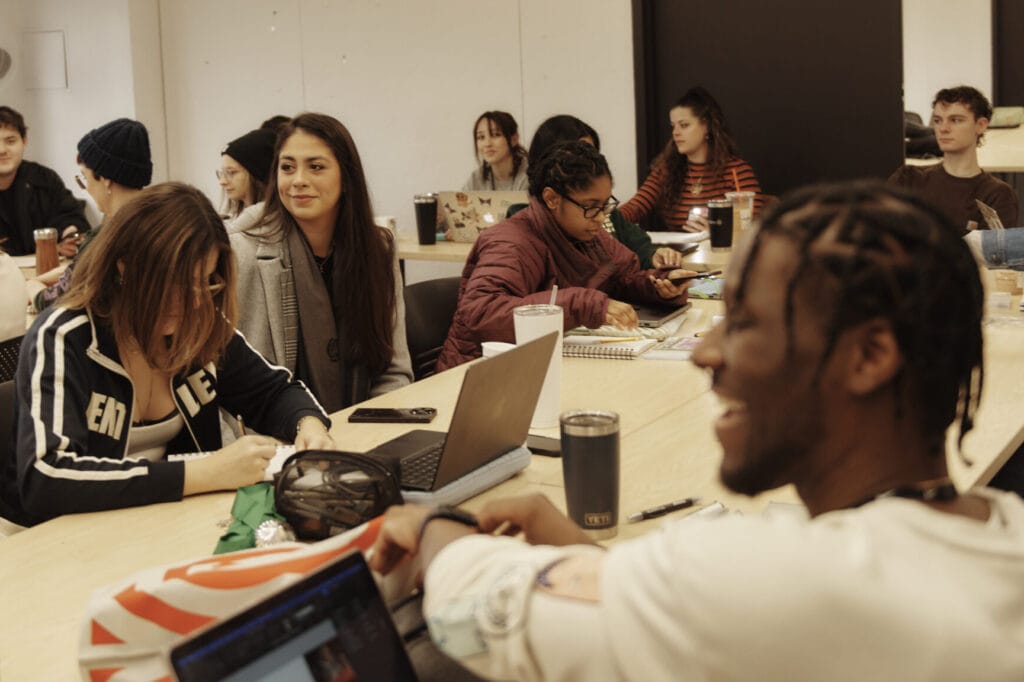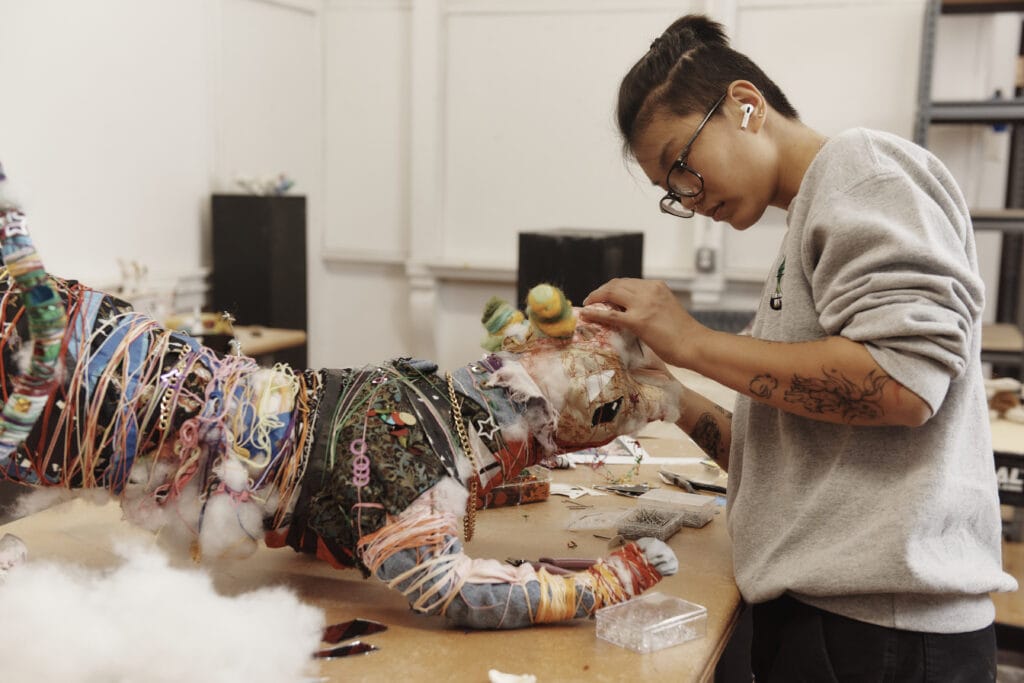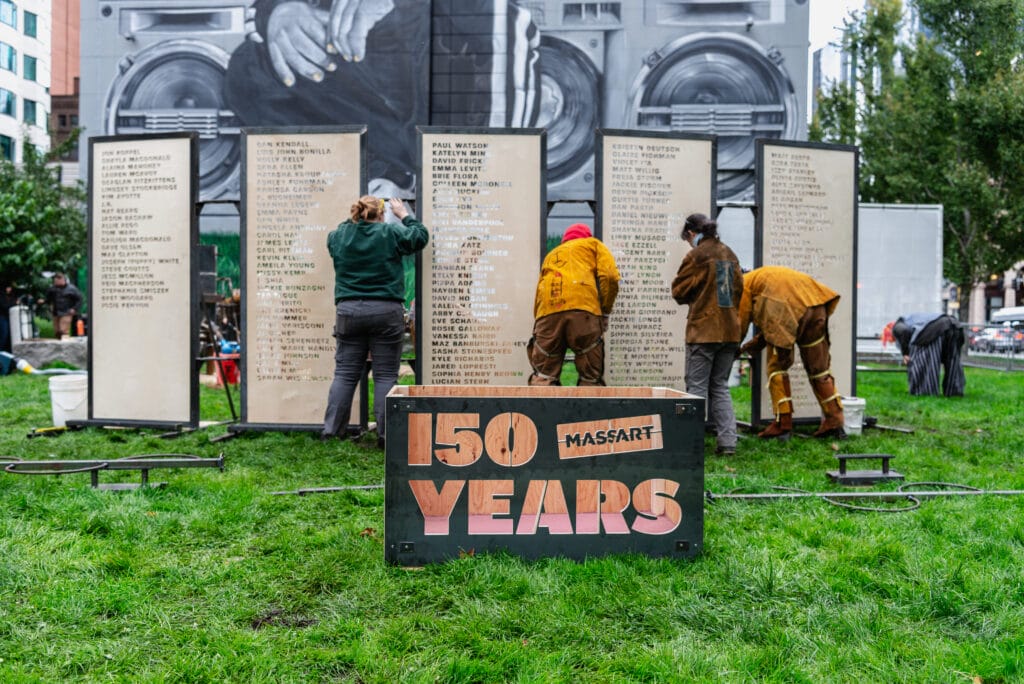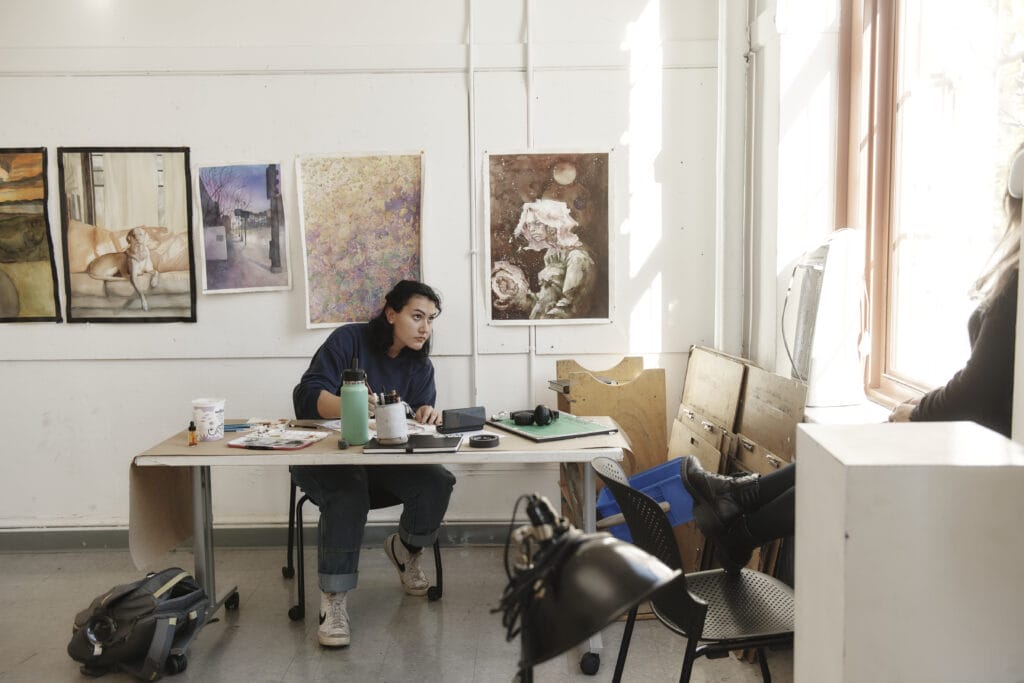Pre-College Summer Studios
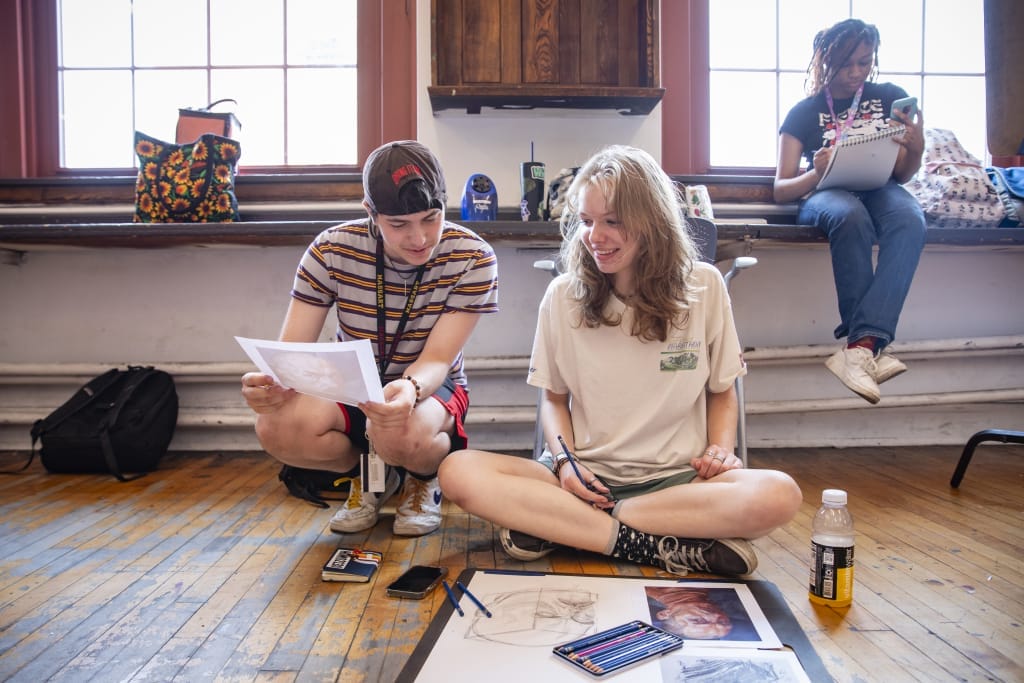

Discover Your Creative Potential in MassArt’s Pre-College Summer Studios
Immerse yourself in a four-week studio art program designed for high school juniors and seniors passionate about the visual arts.
Modeled after MassArt’s renowned Studio Foundation year, our Pre-College Summer Studios program is a four-week intensive experience in art making and critical thinking. Strengthen your foundational skills with three core classes—2D Fundamentals, 3D Fundamentals, and Issues & Images—while exploring your creative passion through an elective of your choice.
Prepare yourself for higher education in MassArt’s dynamic, hands-on environment. This program is perfect for students envisioning a future in the visual arts.
Summer 2026 Schedule: July 20 – August 14, 2026
Classes are held Monday through Fridays: 8:30AM – 4:30PM
Location: On-campus and virtual options (see class descriptions)
Cost: $4,020
For-credit cost includes an additional $630 credit fee.
For-Credit Application Deadline: May 1
Registration Opens: January 12
Registration Closes: May 31
Registrations are accepted on a rolling, space available basis.
Course Descriptions
Required Classes
Pre-College core courses focus on the skills essential to the pursuit, study and practice of art: developing craft, provoking thought, and creating community.
Through observational studies and imaginative drawing, students explore ways to represent form and space. Using composition, scale, line, and value, students develop their toolbox of skills to visually communicate their ideas. Class periods may include a combination of demonstrations, work time, individual and group discussions, video tutorials, and handouts. Students hone their documentation skills for building a portfolio.
This course will explore the wide range of materials and processes that are fundamental in creating meaningful three dimensional artwork. Students will work on transferring drawings and plans into three-dimensional work as well as learn to work directly on sculptural forms. Some of the materials introduced include cardboard, wire, clay and found objects.
By paying close attention to space, objects and the materials that surround us in our own environments, we will work on developing an individualized exploration of space and how sculpture can emerge from it. Students will also be asked to complete projects on their own and hone in documentation skills so that they can work on building a portfolio.
What is art? Why do we look at, and make art? What is the role of the artist in society? This class emphasizes critical analysis of art in terms of context, content, artists’ intent, and social and personal significance. Students gain familiarity with artists and the meaning, impact and interpretation of artwork through research and discussion of a broad range of contemporary and historical work. Students develop a fluency with the language of art as they discuss the content of other artists’ work as well as their own work.
Electives
All students attend one elective. Electives begin during the third week of the program. Electives are designed to introduce students to the techniques of the medium and the historical context of the field. On-Campus and Virtual sections of Pre-College Summer Studios will offer different electives.
Express yourself through animation by telling a story. Students will explore numerous animation techniques, including drawn animation, flip books, paper cutout, clay animation, stop-motion, and more. Students will gain an understanding of film language, editing tools, and sound effects.
Learn and experience what it is to be an illustrator, and the various markets in which illustrators work. Students look at the art of professional illustrators as examples of the range of media and styles used in visual communication. In a variety of media, students employ the techniques used by illustrators to convey meaning and tell stories.
This course will use traditional and alternative materials and processes to explore the many ways artists combine media to communicate ideas and images. Students will work with materials that may include found objects, drawing, painting, and collage. The materials and media will guide the creative process as much as the creative process will inspire artists to use materials and methods of their choice. Looking at contemporary artists will deepen the discourse on mixed media art as students develop their own personal perspectives and styles.
Program Information
All students will be enrolled in 2D Fundamentals, 3D Fundamentals, Issues & Images, and one elective course of their choosing.
When completing the registration form, select one elective course only. If your first choice is full, you will have the option to select another class and be placed on the waiting list.
Registrations are accepted on a first-come, first-served, and space-available basis. All students will be enrolled in 2D Fundamentals, 3D Fundamentals, Issues & Images, and one elective course (course descriptions below).
When selecting an elective on the registration form, please select one choice only. If your preferred class is full, you will have the option to select a different class and be placed on the waiting list.
If the 2D, 3D and Issues & Images format you have selected is full, you will have the option to register for the waitlist. If you choose to register for the waitlist, you will not choose an elective. If a space in the program becomes available, you will choose your elective at that time from the remaining available spaces.
Required Application Materials
- A completed online registration form
- A one-page statement of purpose describing why you want to attend the Pre-College Summer Studios program
This statement will be shared with your instructors prior to the start of the program.
Additional For-Credit Application Materials
- Portfolio
- Portfolio Description List
- One letter of recommendation
Students may apply to take Pre-College Summer Studios for college credit. Students who are accepted and successfully complete the program receive three college credits from MassArt. Credits can be used toward MassArt studio elective courses if the student enrolls at MassArt in the future. Credits may also be accepted at a student’s high school at the discretion of the school.
Students applying for-credit will be enrolled in their elective prior to the application deadline. If accepted, students will then be enrolled in the for-credit section of 2D Fundamentals, 3D Fundamentals, and Issues & Images. Students who are not accepted into the for-credit section will be enrolled in the non credit-bearing section of 2D Fundamentals, 3D Fundamentals, and Issues & Images (unless stated otherwise on the registration form).
Students seeking the for-credit option must also submit the following application materials:
Portfolio
6-8 photographs of your strongest work, including two drawings from observation (not from a photograph):
- One observational drawing must be of a box in the medium of your choice on 18″ x 24″ paper
- The second observational drawing may be of your choosing
Portfolio Description List
All portfolios must be accompanied by a description list. Label each image with a number that corresponds to the description list. Each description must include dimensions, media, and date completed.
Letter of Recommendation
Students applying for-credit are required to submit one letter of recommendation in order to participate in the program. The letter must be from either a faculty or staff member at the student’s high school, or an unrelated adult who is willing and able to speak of the applicant’s maturity and readiness to participate in the Pre-College Summer Studios program.
Applicants are strongly encouraged to upload the recommendation letter to their registration form. However, if doing so will significantly delay the student’s application, the recommendation letter may be submitted via email after the form has been completed. The deadline to submit recommendation letters will be May 31.
Deadline
The deadline to submit an application for the credit-bearing section is May 1. Applications for credit will not be considered until all requirements are submitted.
Submission Information
Portfolio images must be saved as a JPEG or PNG file. Label each file with the student’s last name, first initial, and the image number that corresponds to the description list (Example: Van Gogh_V_Image1).
Portfolio images must be uploaded directly to the registration form as a condensed (.zip) file.
The statement of purpose and portfolio description list must be uploaded directly to the registration form. Students are strongly encouraged to submit the recommendation letter along with the registration form. Please save each document as a Word or PDF document with the student’s last name, first initial, and document name included in the file name (Example: Van Gogh_V_Statement; Van Gogh_V_DescriptionList; Van Gogh_V_RecLetter).
Test your media before sending it in.
Classes will take place on the MassArt campus. The in-person format allows students to experience the college’s facilities and studio spaces, including MAAM, MassArt’s Art Museum. Located on Huntington Avenue in downtown Boston, MassArt is a neighbor of the Museum of Fine Arts and the Isabella Stewart Gardner Museum.
Housing
Supervised housing will not be provided for students enrolled in the On-Campus section of Pre-College Summer Studios. If you are interested in housing, please contact the MassArt Housing Office at summer@massart.edu. Minors will need to be accompanied by an adult in order to reside in the MassArt Residences.
Students will receive a full refund if they withdraw by June 5. Students who fail to notify MassArt Youth Programs of their registration cancellation in writing to k12@massart.edu prior to this date, will not be eligible for a refund.
For questions related to our policies, or registration, please contact k12@massart.edu.

